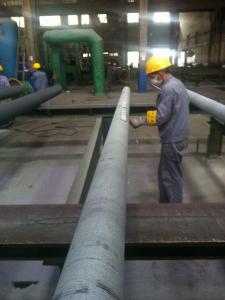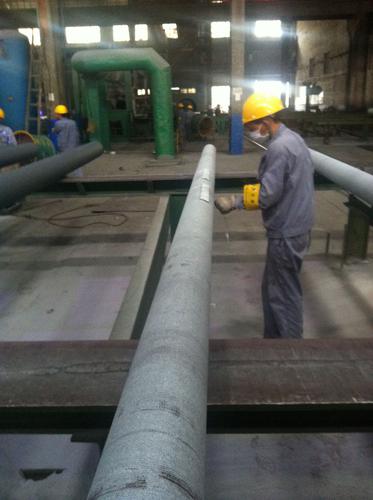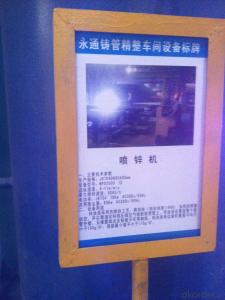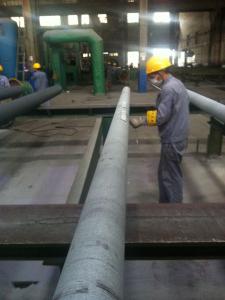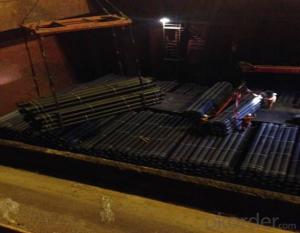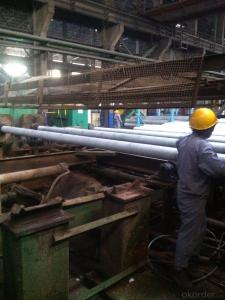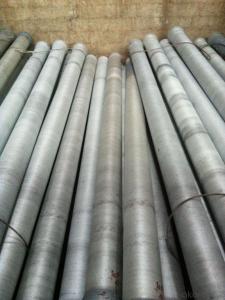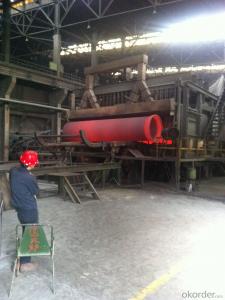DUCTILE IRON PIPE AND PIPE FITTINGS K9 CLASS DN700
- Loading Port:
- Tianjin
- Payment Terms:
- TT OR LC
- Min Order Qty:
- 21 pc
- Supply Capability:
- 3000 pc/month
OKorder Service Pledge
OKorder Financial Service
You Might Also Like
Material : Ductile Cast Iron
Size Range : DN 80mm to DN 2000mm
Unit Effective Length : 6m or 5.7m
Manufacture Standard: ISO 2531:1998/ EN 545:2006/EN 598:2007
Annual capacity : 200,000 tons
Coating Exterior: Zinc 130g/m2 according to ISO 8179-1 and bitumen coating 70 microns.
Cement Interior: Portland Cement/ High Alumina Cement/ Sulphate Resisting Cement Lining according to ISO 4179
Special requirements on external coating and internal lining can be applied
We also provide accessories such as SBR/EPDM rubber gaskets, lubricant paste, pipe caps, PE sleeves, etc.
Additional Parts:
Each pipe is strictly inspected according to related standard to ensure permanently high performance.
Easy Installation at site and service free for life
Long Service Lifespan
Quotation will arrive you within 24hours once we get your inquiry.
We guarantee offering you a competitive price.
A copy of original inspection reports of pipes will be offered after shipment.
Photos of loading process will be sent to the customer after shipment effect.
We will follow-up the delivery progress after shipment effect and update to the customer on weekly basis.
- Q: The role of chromium in nodular cast iron
- Chromium has better strengthening and toughening effect in nodular cast iron. Chromium containing cast iron has the characteristics of high strength, high elongation, high impact value and low hardness.
- Q: How does ductile iron pipe handle temperature changes?
- Ductile iron pipe is known for its ability to handle temperature changes effectively. The unique properties of ductile iron make it highly resistant to thermal expansion and contraction, allowing it to withstand extreme temperature variations without significant deformations or failures. When exposed to temperature changes, ductile iron pipes can expand or contract within certain limits due to its inherent ductility. This flexibility helps to accommodate thermal stresses and prevent the pipe from cracking or breaking. The material's high tensile strength and elasticity also contribute to its ability to handle temperature changes without significant structural damage. Moreover, ductile iron pipes have a low coefficient of thermal expansion, meaning they expand and contract at a relatively slow rate compared to other materials. This characteristic minimizes the potential for stress on the pipe joints and reduces the risk of leaks or failures. In addition to its excellent thermal stability, ductile iron pipe also features a protective lining that further enhances its resistance to temperature changes. The linings, such as cement mortar or polyethylene, create a barrier between the pipe and the transported fluid, preventing any adverse effects caused by thermal variations on the pipe's internal surface. Overall, ductile iron pipe is a reliable choice for applications where temperature changes are common. Its ability to withstand thermal stresses, low coefficient of thermal expansion, and protective linings make it a durable and efficient solution for various infrastructural needs, including water distribution, wastewater management, and industrial applications.
- Q: Can ductile iron pipes be used for trenchless pipe rehabilitation methods?
- Yes, ductile iron pipes can be used for trenchless pipe rehabilitation methods. Trenchless pipe rehabilitation methods involve repairing or rehabilitating existing pipelines without the need for extensive excavation or trenching. Ductile iron pipes are commonly used in these methods due to their durability, strength, and resistance to corrosion. They can be rehabilitated using various trenchless methods such as pipe lining, pipe bursting, and slip lining. These methods involve inserting a new lining or pipe inside the existing ductile iron pipe, thereby extending its lifespan and improving its structural integrity. Ductile iron pipes are preferred for trenchless rehabilitation as they can withstand the forces and pressures involved in the process while providing a long-lasting and reliable solution.
- Q: Can ductile iron pipes be used for stormwater drainage?
- Yes, ductile iron pipes can be used for stormwater drainage. Ductile iron pipes are known for their strength and durability, making them suitable for various applications, including stormwater drainage systems. These pipes have high tensile strength and can withstand heavy loads and pressure, making them ideal for carrying large volumes of stormwater. Additionally, ductile iron pipes have a smooth interior surface that reduces friction and allows for efficient flow of water, minimizing the risk of blockages and clogging. With proper installation and maintenance, ductile iron pipes can provide a reliable and long-lasting solution for stormwater drainage.
- Q: How to control mortar proportioning in ductile iron pipe cement coating
- The calculation steps are: first to calculate the amount of plastering engineering (area), and then check the "national construction basic quota" quota in the corresponding amount of mortar project, engineering quantity multiplied by the amount of mortar that fixed amount of mortar, the mortar amount multiplied by the corresponding mix ratio of mortar, the consumption of raw materials can be obtained.
- Q: Are ductile iron pipes suitable for railway crossings?
- Railway crossings can indeed utilize ductile iron pipes. Ductile iron, a robust and long-lasting material, finds extensive use in numerous applications, which include water and sewage systems. Its exceptional tensile strength and flexibility allow it to withstand heavy loads and vibrations, both of which are commonly encountered in the vicinity of railway crossings. Moreover, ductile iron pipes exhibit exceptional resistance to corrosion, making them particularly valuable in areas prone to moisture and exposure to diverse weather conditions. This resistance guarantees the pipes' durability, ultimately reducing the need for maintenance and replacement, thus cutting costs. Furthermore, ductile iron pipes are renowned for their effortless installation and versatility. They seamlessly integrate with other pipe types and fittings, facilitating their incorporation into the overall railway crossing infrastructure. However, it is important to bear in mind that the suitability of ductile iron pipes for railway crossings hinges on various factors, such as load requirements, soil conditions, and specific project specifications. Consulting engineering professionals and adhering to industry standards and regulations is vital to ensure the appropriate selection and installation of ductile iron pipes for railway crossings.
- Q: Are ductile iron pipes suitable for gravity flow applications?
- Yes, ductile iron pipes are suitable for gravity flow applications. Ductile iron pipes have high strength and durability, making them ideal for carrying fluids under gravity. They can withstand the pressure and weight of fluid flow without the need for additional support or reinforcement. Additionally, ductile iron pipes have excellent corrosion resistance, which ensures their long-term performance in gravity flow systems.
- Q: Are there any specific standards or regulations for ductile iron pipe?
- Yes, there are specific standards and regulations for ductile iron pipe. Ductile iron pipe is commonly used in water and wastewater systems due to its strength and durability. The most widely recognized standard for ductile iron pipe is the American Water Works Association (AWWA) C151 standard. This standard covers the minimum requirements for ductile iron pipe, including materials, dimensions, tolerances, and testing methods. It also provides guidelines for the manufacturing, installation, and maintenance of ductile iron pipe systems. In addition to the AWWA C151 standard, there are also other standards and regulations that govern the use of ductile iron pipe in different countries. For example, in Europe, ductile iron pipe is governed by the EN 545 and EN 598 standards, which specify the requirements for ductile iron pipes and fittings used in water supply and wastewater systems. Furthermore, government agencies such as the Environmental Protection Agency (EPA) in the United States may have specific regulations and guidelines for the use of ductile iron pipe in certain applications, such as drinking water systems. It is crucial for manufacturers, contractors, and engineers involved in the design, installation, and maintenance of ductile iron pipe systems to ensure compliance with these standards and regulations. This helps to ensure that ductile iron pipe is manufactured to the highest quality standards, and that it is installed and maintained properly to ensure its longevity and reliability in water and wastewater systems.
- Q: Can ductile iron pipes be used for underground cooling water systems?
- Yes, ductile iron pipes can be used for underground cooling water systems. Ductile iron pipes are known for their durability, high strength, and resistance to corrosion, making them suitable for various applications, including underground installations. In cooling water systems, where the pipes are exposed to water and potentially harsh environments, ductile iron pipes provide a reliable and long-lasting solution. Their ability to withstand high pressure and temperature fluctuations further ensures the efficient and safe operation of the cooling water system. Additionally, ductile iron pipes are often preferred for underground installations due to their ease of installation, low maintenance requirements, and cost-effectiveness.
- Q: Can ductile iron pipes be used for irrigation systems in agricultural fields?
- Yes, ductile iron pipes can be used for irrigation systems in agricultural fields. Ductile iron pipes are known for their durability, strength, and corrosion resistance, making them a suitable choice for various applications, including irrigation systems. These pipes are capable of withstanding high pressures and can handle the demands of transporting water for irrigation purposes. Additionally, the ductile iron material is resistant to environmental factors such as UV rays, soil chemicals, and temperature fluctuations, ensuring a long lifespan for the pipes. Furthermore, ductile iron pipes have excellent flow characteristics, allowing for efficient water distribution throughout the agricultural fields. Overall, ductile iron pipes are a reliable and robust option for irrigation systems in agricultural fields, providing a sustainable and efficient solution for water distribution.
Send your message to us
DUCTILE IRON PIPE AND PIPE FITTINGS K9 CLASS DN700
- Loading Port:
- Tianjin
- Payment Terms:
- TT OR LC
- Min Order Qty:
- 21 pc
- Supply Capability:
- 3000 pc/month
OKorder Service Pledge
OKorder Financial Service
Similar products
Hot products
Hot Searches
Related keywords
